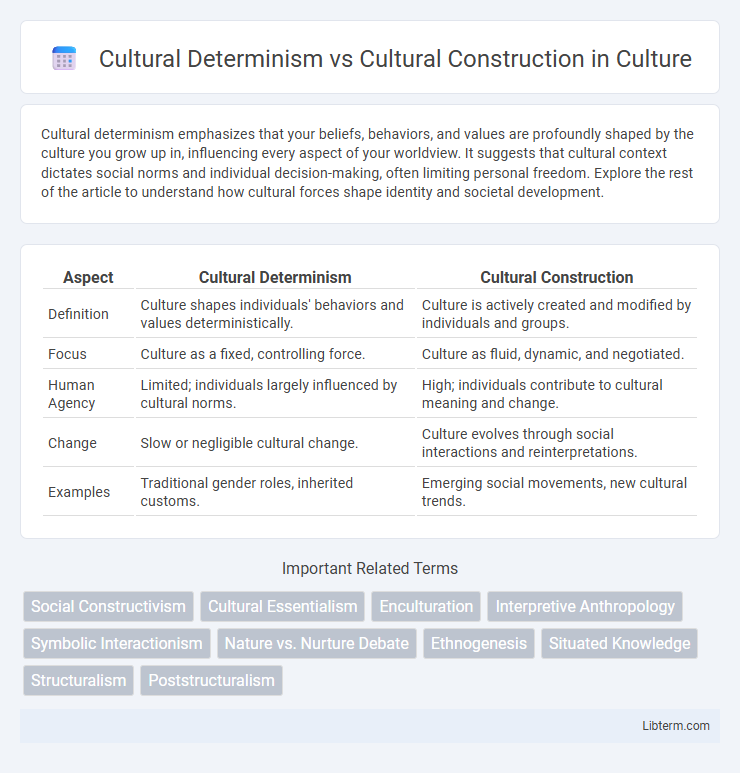Cultural determinism emphasizes that your beliefs, behaviors, and values are profoundly shaped by the culture you grow up in, influencing every aspect of your worldview. It suggests that cultural context dictates social norms and individual decision-making, often limiting personal freedom. Explore the rest of the article to understand how cultural forces shape identity and societal development.
Table of Comparison
| Aspect | Cultural Determinism | Cultural Construction |
|---|---|---|
| Definition | Culture shapes individuals' behaviors and values deterministically. | Culture is actively created and modified by individuals and groups. |
| Focus | Culture as a fixed, controlling force. | Culture as fluid, dynamic, and negotiated. |
| Human Agency | Limited; individuals largely influenced by cultural norms. | High; individuals contribute to cultural meaning and change. |
| Change | Slow or negligible cultural change. | Culture evolves through social interactions and reinterpretations. |
| Examples | Traditional gender roles, inherited customs. | Emerging social movements, new cultural trends. |
Introduction to Cultural Determinism and Cultural Construction
Cultural determinism posits that an individual's behaviors, beliefs, and identity are shaped primarily by the cultural environment in which they are raised, emphasizing the dominant role of culture in influencing human actions. In contrast, cultural construction theory argues that cultural realities and meanings are actively created and negotiated by individuals and groups, highlighting the dynamic and fluid nature of culture. Understanding these frameworks is essential for analyzing how culture impacts social behavior and identity formation across different societies.
Defining Cultural Determinism
Cultural determinism asserts that human behavior, beliefs, and values are primarily shaped by cultural conditions and social environments, implying that individuals' actions are constrained and influenced by cultural norms. This theory posits culture as the dominant force dictating identity, psychology, and social development, often downplaying biological or individual agency factors. Understanding cultural determinism is essential for analyzing how societal frameworks mold human thought and behavior within diverse cultural contexts.
Understanding Cultural Construction
Cultural construction emphasizes that social realities and meanings are created through shared human interactions, language, and practices rather than being inherently determined by biological or historical factors. This perspective highlights the fluidity and variability of cultural norms across different societies and times, suggesting that identities, beliefs, and behaviors are actively shaped by social processes. Understanding cultural construction allows for deeper insights into how power dynamics, communication, and collective experiences influence the formation and transformation of cultural knowledge.
Historical Roots of Cultural Determinism
Cultural determinism traces its historical roots to 19th-century anthropological theories, where culture was seen as the primary force shaping human behavior and societal development. Early scholars like Edward Tylor and Franz Boas emphasized culture as an inherited and unchanging determinant of social norms and identity. This perspective contrasts with cultural constructionism, which views culture as fluid, dynamic, and shaped by social interactions and historical contexts.
Origins and Evolution of Cultural Construction Theory
Cultural Construction Theory originated in the early 20th century, rooted in social constructivism and influenced by scholars like Clifford Geertz and Peter Berger, emphasizing that culture is actively created and maintained through social interactions rather than predetermined by biology or environment. The theory evolved to challenge Cultural Determinism, which asserts that culture rigidly shapes human behavior and identity, by highlighting fluidity, diversity, and the power dynamics involved in cultural meaning-making. Key developments include the integration of postmodern perspectives, illustrating culture as an ongoing, contested process shaped by historical and social contexts rather than fixed determinants.
Key Differences Between Cultural Determinism and Cultural Construction
Cultural determinism emphasizes that individuals' behaviors and values are shaped primarily by their cultural environment, suggesting a fixed influence of culture on identity. In contrast, cultural construction views culture as a dynamic process where identities and social realities are continuously created and negotiated through interactions. The key difference lies in determinism's focus on culture as a pre-existing, constraining force, whereas construction highlights culture as fluid and subject to change through human agency.
Influential Thinkers and Theories
Cultural determinism, championed by Bronislaw Malinowski and Edward Sapir, emphasizes culture as the primary force shaping human behavior and social structures. In contrast, cultural construction theory, advanced by scholars like Clifford Geertz and Pierre Bourdieu, argues that culture is actively created through symbolic interactions and power relations. These influential thinkers highlight the dynamic interplay between inherited cultural norms and the ongoing processes of meaning-making within societies.
Real-World Examples of Both Perspectives
Cultural determinism argues that individuals' behaviors and beliefs are shaped primarily by their cultural environment, as seen in traditional Japanese society where group harmony dictates social interactions and decision-making. In contrast, cultural construction emphasizes that cultures are dynamic and continuously created through social processes, exemplified by the evolving concept of gender roles in Western societies influenced by feminist movements and media representation. These perspectives highlight how fixed cultural norms or ongoing social negotiations influence identity and behavior globally.
Critiques and Limitations of Each Approach
Cultural determinism often faces criticism for oversimplifying human behavior by attributing it solely to cultural influences, neglecting individual agency and biological factors. Cultural construction is critiqued for potentially underestimating the persistence of certain cultural patterns and ignoring structural constraints like economic or political forces. Both approaches struggle with balancing the influence of culture against innate human nature and social context, limiting their explanatory power when applied in isolation.
Conclusion: The Ongoing Debate and Its Implications
Cultural determinism emphasizes how culture shapes individual behavior and social structures, while cultural construction highlights the fluid, negotiated nature of cultural meanings. The ongoing debate underscores the complexity of identity formation and social dynamics in a globalized world. Understanding this tension informs fields like anthropology, sociology, and cultural studies, providing insights into power relations, cultural change, and policy development.
Cultural Determinism Infographic

 libterm.com
libterm.com